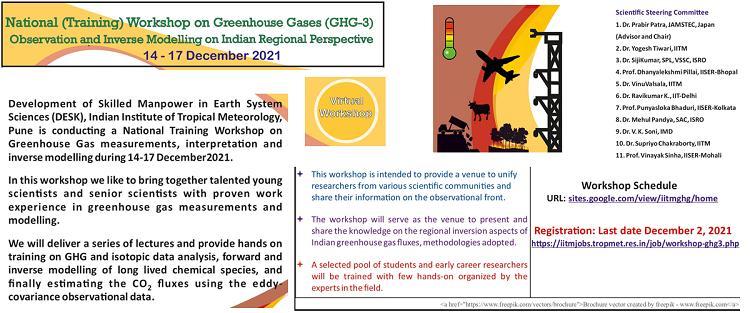National (Training) Workshop on Greenhouse Gases (GHG-3)
National (Training) Workshop on Greenhouse Gases (GHG-3):
Observations and Inverse Modeling on
Indian Regional Perspective
(Virtual Workshop) Between 14-17 Dec 2021
Preamble
The Paris Agreement (2015) during the 21st Conference of Parties (COP21) called for Intended Nationally Determined Contributions (INDCs) to greenhouse gases emission reduction to limit global warming below 2°C or remains close to 1.5°C as possible. In response to that, India has ratified the deal in October 2016 for a reduction of CO2 emission intensity (emission per GDP) by up to 35% by 2030 relative to that in 2005, and create a terrestrial carbon sink of up to 3 Pg-CO2 (1Pg = 1015g) by 2030. Any claim for GHGs emission reduction has to pass through independent monitoring, reporting, and verification (MRV). The top-down sources and sink estimations using atmospheric chemistry-transport models and observations of chemical species concentration offer an attractive MRV system, which is currently under development in developed nations, presumably due to the limited availability of atmospheric observations. However, this situation is changing fast in India, as the surface measurement networks are established through national and international collaborative efforts, and then there are observations from satellites covering the whole globe in most of the seasons. The measurements, monitoring, and modeling of long-lived Greenhouse gases from India are gaining momentum in the recent past. Various groups in India measure atmospheric CO2 and CH4 as independent research modules. A consensus on the data availability of any kind in a uniform data-sharing platform is lacking, say it be for Eddy covariance measurements, city-based CO2/CH4/CO measurements, CO2/CH4 measurements in background environment, or remote sensing CO2/CH4 measurements. This is critical at the juncture of the growing need of monitoring the inventories and fluxes of greenhouse gases.
This workshop is intended to provide a venue to unify researchers from various scientific communities and share their information on the observational front.
In addition, a growing number of inverse modeling efforts from India is on an upraise in the recent past.
The workshop will serve as the venue to present and share the knowledge on the regional inversion aspects of Indian greenhouse gas fluxes, methodologies adopted.
A selected pool of students and early career researchers will be trained with few hands-on organized by the experts in the field.
Scientific Steering Committee
1. Dr. Prabir Patra, JAMSTEC, Japan(Advisor and Chair)
2. Dr. Yogesh Tiwari, IITM
3. Dr. Siji Kumar, SPL, VSSC, ISRO
4. Prof. Dhanya Pillai, IISER-Bhopal
5. Dr. VinuValsala, IITM
6. Dr. Ravikumar K., IIT-Delhi
7. Prof. Punyasloke Bhaduri, IISER-Kolkata
8. Dr. Mehul Pandya, SAC, ISRO
9. Dr. V. K. Soni, IMD
10. Dr. Supriyo Chakraborty, IITM
11. Prof. Vinayak Sinha, IISER-Mohali
If you have any questions about the Workshop, please send an email to Dr. Vinu K. Valsala, Scientist F
Phone: 020-25904514
Email: valsala@tropmet.res.in




